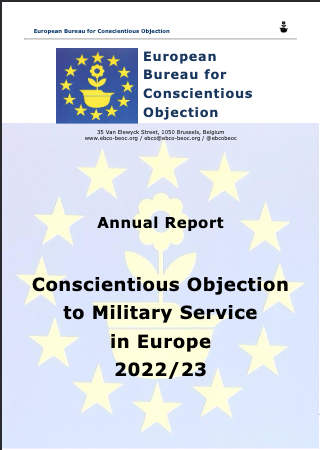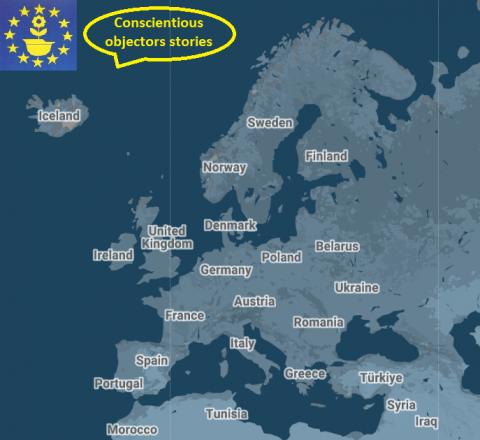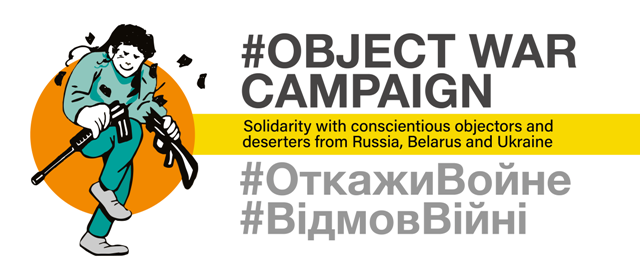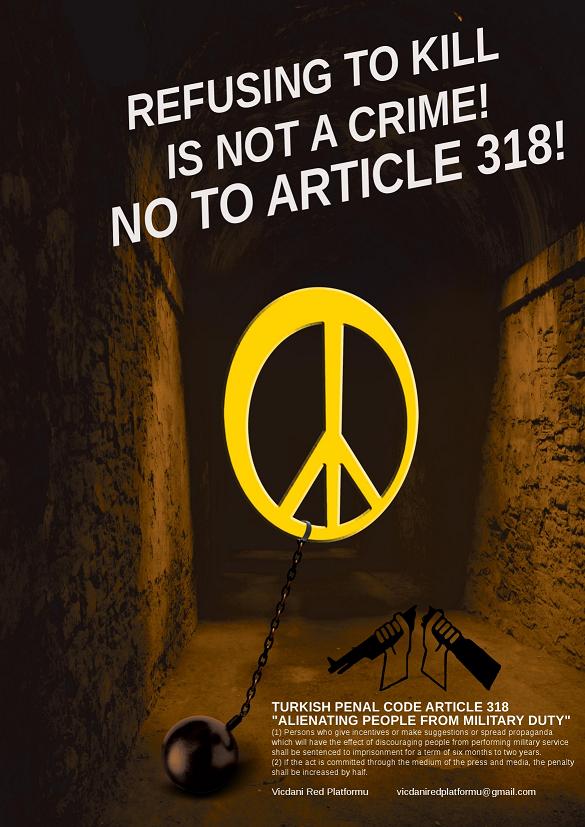Focus on the situation in Russia - independent report by the "Russian Movement of Conscientious Objectors" (frequently updated)

Anti-War Action and Consequences Suffered by Protesters
The military invasion of Ukraine has prompted anti-war protests, which Russian authorities have met with an unprecedented and escalating severity. The police and security services have utilized a brutal and extensive repertoire of punitive measures against those expressing anti-war sentiments, culminating in the most significant wave of political repression under Putin's regime.
The February 2023 report from OVD-Info highlights a staggering number of arrests in 2022, nearly 20,000, all for anti-war sentiments. This includes 177 for internet activity, 141 for symbols, 324 made post-protest, and 26 for public statements or private conversations, even including positions held by relatives. The authorities have expanded their surveillance and suppression of dissent, using facial recognition technology to pre-emptively detain activists at public events. This practice extends their previous method of tracking individuals post-protest, with 141 people detained through facial recognition alone and authorities confirming its use against rally participants.
The suppression of protests is both systemic and violent. At least 413 instances of police use of force have been reported, ranging from physical violence, such as beating, strangling, and injuring the detainees, to the use of stun guns. Disturbingly, multiple instances of sexual violence against arrested women, who constitute 46% of individuals detained for their anti-war stance, and non-binary individuals have been reported. The issue is compounded by the police's refusal to provide medical assistance in many cities. The violence continues even after arrest, with detainees frequently subjected to further abuse in departmental custody.
The Russian legal system has been manipulated to serve as a tool for repression. In the first half of 2022, arrests for participation in actions were administrative in 22% of cases, compared to 12.5% in 2021. The authorities have increased their use of Criminal Code articles to prosecute anti-war protesters. For example, Article 207.3 was used against individuals such as Aleksandra Skochilenko, a St. Petersburg painter and LGBTQ person, for swapping store price tags with anti-war texts, and Vladimir Kara-Murza, a Moscow politician, for his speech to the Arizona House of Representatives. Article 280.3 has been used for "discrediting" the Russian military. This rise indicates a growing state willingness to exploit legal mechanisms to quash dissent.
Authorities have initiated the largest mass criminal prosecution wave in Russian history, with 447 people persecuted over 363 days for their anti-war stance. Those disseminating information contrary to the official government narrative regarding the war have been specifically targeted. The primary categories of "fakes," or information deemed deliberately false by investigators and courts, revolve around the war's realities, such as the murder of Ukrainian civilians, the shelling of civilian objects, Russian military personnel deaths, and other Russian military war crimes. Some of the harshest sentences for expressing anti-war sentiments include:
- Ilya Yashin, a Moscow City Duma deputy, sentenced to 8 years and 6 months for an online stream about Russian military crimes in Bucha.
- Alexey Gorin, another Moscow City Duma deputy, received a 6-year and 11-month penal colony sentence for his comments about the impropriety of holding a children's drawing contest amid the ongoing war and the deaths of Ukrainian children.
- Maria Ponomarenko, a journalist, was sentenced to 6 years for a post about the destroyed drama theater in Mariupol.
- Egor Skorohodov (Igor Maltsev), a Saint Petersburg activist, was sentenced to 3 years and 8 months in a penal colony for burning a scarecrow in camouflage with a bag on its head saying “Take me!”
Furthermore, at least 5,846 cases under Article 20.3.3 of the Code of Administrative Offences (on “discrediting the Armed Forces”) have been brought before Russian courts. Of these, a total of 4,559 cases resulted in a punitive sentence, with fines collectively exceeding 100,000,000 rubles (based on 3,091 court decisions where the payable amount is known).
Protests have undergone a significant transformation, shifting from large-scale street demonstrations to individual pickets, distribution of anti-war leaflets, graffiti, destruction of pro-war symbols, anti-war sentiment expression on social networks, and the launch of anti-war initiatives and projects. Despite this change, the authorities' response remains severe, with protesters facing police visits, confiscation of posters and symbols, and administrative liability, even if they evade detention.
Regardless of the severe repression, individuals continue to find ways to voice their opposition to the conflict and challenge the government's narrative. However, the authorities' heavy-handed approach is creating a climate of fear and intimidation, making it increasingly difficult for people to express their views. The use of the Criminal Code to prosecute protesters and activists is particularly concerning, indicating a concerted effort to criminalize dissent and silence opposition voices. The sentences handed down to those expressing anti-war sentiments are deeply troubling, with individuals receiving lengthy prison terms for relatively minor offenses. The rising use of fines and punitive measures to silence critics has become a common practice in Russia, with the number of cases brought under Article 20.3.3 of the Code of Administrative Offences demonstrating the government's willingness to employ any means necessary to maintain control. It is crucial for the international community to continue voicing its opposition to these abuses and support those fighting for their rights and freedoms in Russia.
Changes in Legislation during Wartime
The repercussions faced by those opposing Russia's military actions through anti-war protests highlight a disturbing trend of civic liberties and fundamental human rights suppression in the country. Over 15,000 people were arrested within the first two months of the invasion, from February 24 to April 23, 2023, demonstrating an unprecedented scale and severity of consequences.
The Russian government's systematic oppression in response to anti-war protests has featured an escalation in legal and punitive measures. The fines for violating rally laws have skyrocketed from 1,000 to 300,000 rubles, a 300-fold increase, underlining the government's financial attempt to squelch dissent. The addition of up to 30 days' arrests and compulsory labor further intensifies the deterrent.
Article 212.1 of the Criminal Code, dubbed the "Dadin" clause, introduced following significant anti-war protests against Ukraine in 2014, has become a formidable instrument in curtailing protests. The law penalizes "repeated violation of the established procedure for organizing or holding a meeting, rally, demonstration, march, or picket," thereby setting a perilous precedent as it targets not only specific individuals but also potential rally and demonstration participants.
Moreover, the expedited decision-making process has enabled the Russian government to swiftly pass restrictive legislation. A notable example is the enactment of bills on “discrediting” Russian military actions and “fake news” regarding the Russian Armed Forces on March 4, the ninth day of the invasion. Despite initial claims that these measures wouldn't target those using the "no to war" slogan, calls for peace have become a basis for both administrative and criminal prosecution.
Critical stages of discussion and public deliberation have been bypassed in the legislative process. For instance, amendments to Article 20.3.3 were surreptitiously appended to a bill on fire safety rules in forests. This stealthy tactic displays a concerning disregard for open dialogue and civic participation in legislative matters.
The enforcement of these laws has been prompt and resolute. The first reports of protocols drafted and court trials initiated under the administrative article on discrediting the military surfaced mere days after the bills were signed into law. This rapid action illustrates the Russian government's grim resolve to silence dissenting voices.
New and broadened legislation on "threats to state security" further stifles civil liberties. For example, Article 275.1 of the Criminal Code now encompasses provisions on "confidential" collaboration with foreign states and organizations, resulting in more severe punishments and posing a threat to international cooperation and dialogue.
Reacting to evolving protest actions, like setting military recruitment offices ablaze, the Russian government has altered legislation. The article on sabotage now includes norms aimed at disrupting military and defense complex activities, leading to hefty charges and penalties.
The crackdown on digital spaces and the broadening definition of extremism has led to a decline in space for public discourse. Online platforms, crucial for dissent and organization, have faced intense scrutiny and censorship, further restricting freedom of expression and association.
The most recent legislative development in Russia, involving the legalization of electronic military summonses and the criminalization of disregarding them, has sparked serious concerns among legal experts and human rights advocates. The bill was approved by the State Duma on April 11th and passed through second and third readings in a single day, with President Putin signing it into law on April 14th, 2023. The extraordinarily swift passage of the bill by the State Duma, in just 23 minutes, has been criticized as a blatant display of the authorities' disregard for proper legal procedures and due process. The hasty approval of a law that broadens the scope of mass conscription without adequate debate or public input raises alarming questions about the state of democracy and the rule of law in contemporary Russia.
In conclusion, the actions and ensuing repercussions suffered by anti-war protesters highlight a concerning trajectory of eroding democratic norms and escalating autocratic control in Russia. The implications of this trend, for both domestic civil society and international human rights standards, are deeply disconcerting and demand vigilant attention from the global community. The accelerated changes in legislation, paired with their swift and severe enforcement, underscore an urgent need for international bodies to closely monitor, address, and counter these worrying developments.
The conscription and mobilization processes in Russia throughout 2022 and 2023 have been mired in numerous human rights violations and marked by significant changes to the legal framework that impinge upon the rights of draftees. The Movement of Conscientious Objectors has documented hundreds of individuals either seeking to withdraw their participation in aggressive military actions or striving to avoid military service altogether. Prior to mobilization, soldiers could request the termination of their contracts with the Ministry of Defense, a right invoked by hundreds seeking to conscientiously object. However, once mobilization commenced, contract termination became unattainable, leaving the MCO dealing with thousands of individuals on the frontline either insisting on their right to alternative civilian service or demanding demobilization on medical grounds.
In reaction to this surge of conscientious objectors, military commanders resorted to creating illicit detention centers, colloquially known as “cellars," where those refusing frontline service are unlawfully detained, often under torturous conditions. Notable instances of such illegal detentions took place in Bryanka in July and Zaitsevo in November 2022, with approximately 300 individuals unlawfully held in each camp. To date, over 13 such camps, officially termed as Psychological Rehabilitation Centers by Russian authorities, have been identified. The conditions for alternative civilian service within Russia remain punitive and discriminatory, typified by extended terms, poor living conditions, and low remuneration.
In theory, mobilization in Russia should be managed by independent Mobilization Commissions, civilian entities. However, in practice, the Military Commissar makes virtually all mobilization decisions. In most regions, civil society remains ignorant of the Mobilization Commissions' members since the orders to form these commissions are not made public. Following the announcement of mobilization, human rights defenders reported mass abductions of people from hostels, subways, homeless shelters, and residential building entrances. Caught citizens were threatened with criminal prosecution if they refused to report to the military unit. Although the maximum penalty for evading mobilization is a modest fine of 10 to 50 euros, fear often coerces individuals into acceptance.
Under the Russian Constitution, citizens retain the right to request the replacement of military service with alternative civilian service during mobilization. However, Russia has not legislated how alternative civilian service operates during mobilization, resulting in mass applications for alternative service without the authorities' capacity to process them.
Regarding standard conscription, draftees are more legally protected than those mobilized, as the procedure has remained relatively unchanged for the past 30 years. Still, this system is not without its human rights infractions, with the lack of an independent civil decision-making body being a significant concern. The Draft Commission, responsible for decisions to replace compulsory military service with alternative civil service, is formed based on municipalities but lacks funding and holds its sessions at the Military Commissariat. Thus, in effect, the Military Commissariat's representatives decide on applications to substitute military service with alternative civil service.
In April 2023, the State Duma passed amendments legalizing electronic summonses for conscription through a personal account on "Gosuslugi." While this could streamline mobilization, it raises concerns about citizens' rights and freedom of movement restrictions. Penalties for failing to report to the recruitment center on the specified day are severe, with consequences potentially affecting an individual's future ability to support themselves and their families.
In addition, the penalties for failing to appear at the recruitment center on the specified day are severe, including being barred from becoming individual entrepreneurs, managing real estate, driving a car, or taking a loan. These restrictions may have long-term consequences for individuals who fail to appear for conscription, potentially affecting their ability to support themselves and their families in the future.
Furthermore, the creation of a register for individuals liable for military service, containing personal information such as health and education records, residence and employment details, and foreign citizenship or residence permits, poses data privacy and protection concerns. The collection and use of such personal data must be stringently regulated to prevent misuse, and citizens should be thoroughly informed about how their data is being used and safeguarded.
Overall, the Russian process of conscription and mobilization has been riddled with issues and human rights abuses. The unlawful detention and torture of conscientious objectors, coupled with the absence of an independent civil decision-making body for the Draft Commission, underscore the urgent need for reform and heightened accountability in the conscription process. The punitive nature of alternative civilian service, as well as the harsh penalties for failing to report for conscription, call for careful examination and revision. While the new amendments legalizing electronic summonses for conscription may offer some efficiency advantages, they must be introduced with proper legal oversight and protections to ensure citizens' rights and freedoms are not unduly compromised.
Conscientious Objection during Wartime
The handling and punishment of conscientious objectors in Russia during wartime are marked by considerable concerns, as recent reports on Russian garrison courts reveal. These courts have dealt with 708 cases initiated under criminal articles that were made more stringent following the start of mobilization, including unauthorized abandonment of military service, disobedience of orders, and desertion. Judgments have been issued in 360 of these cases. Unauthorized abandonment is the most frequent charge, accounting for 629 cases, with more than half of these soldiers being absent for over a month. Objectors and deserters are often subjected to show trials to intimidate other soldiers, with arrests taking place in front of their units, verdicts being announced within military units, and judges delivering "preventive talks."
Yet, these cases are often concealed from the public. Verdicts are frequently not published, and sentencing details and statistics are withheld under the guise of military secrecy. This lack of transparency around trials is alarming and poses questions about the openness and accountability of the Russian military justice system. A significant number of service members, over a third of the known sentences under the AWOL article, receive suspended sentences, allowing them to be returned to the front lines. Meanwhile, those refusing to participate in the war without deserting their units are charged with disobeying orders. The number of such defendants is rising, with 25 cases currently pending in the courts. However, legal experts suggest that non-compliance with orders is a preferable option for conscientious objectors, as the penalties for not executing orders are generally less severe than those for other mobilization-related offenses.
Despite the escalating number of cases against conscientious objectors, a high proportion of those convicted receive suspended sentences and are reassigned to the front lines. Soldiers who leave their units during wartime for reasons such as visiting loved ones or lack of understanding of the implications typically face less harsh punishments than those deserting to evade being deployed to the front lines. The courts' stance on this matter is still evolving, with no unified position established yet.
The handling of conscientious objectors by the Russian military raises significant concerns regarding the military justice system and soldiers' rights. The use of show trials for objectors and deserters as an intimidation tactic, coupled with the frequent concealment of such cases from the public eye, highlight a dearth of transparency and accountability in the military justice system. The common practice of issuing suspended sentences and reassigning service members to the front lines also raises questions about the efficacy of these sentences in deterring such conduct. The increasing number of cases against conscientious objectors underscores the challenges faced by those endeavoring to exercise their human rights while serving in the military.
The case of Senior Lieutenant Vasiliev, who faced criminal charges under the newly enacted law allowing the incarceration of soldiers refusing to execute orders for up to three years, has sparked international controversy and debate. Vasiliev's case underscores the critical importance of soldiers' rights and the necessity for military personnel to have the autonomy to make personal life decisions. His actions have encouraged others to pursue good and effect positive change, emphasizing the significance of empathy, kindness, and compassion in shaping a better world for all.
In conclusion, the treatment of conscientious objectors by the Russian military remains a contentious issue. The escalating number of cases against such individuals, the lack of transparency in the trials, and the common practice of issuing suspended sentences and reassigning service members to the front lines all raise concerns about the nature of the military justice system and the rights of soldiers. The case of Senior Lieutenant Vasiliev serves as a potent reminder of the importance of soldiers' rights and the necessity for military personnel to exercise their human rights while serving in the military.
The period of 2022/23 has witnessed a substantial escalation in the pressures exerted on anti-militaristic NGOs in Russia. The Russian government has actively leveraged labels such as "foreign agents," "undesirable organizations," and "terrorist or extremist" to target organizations and individuals expressing anti-war sentiments and resisting governmental actions. As of December 2022, the "foreign agents" list included over 200 individuals, 55 media organizations/journalists, and 63 NGOs, totaling 348 entities. Additionally, 25 organizations were declared "undesirable" within the year.
The tendency to label organizations as "foreign agents" and "undesirable" intensified following the outbreak of the war. These designations were strategically employed to stifle civil society and anti-war protests. A law enacted in June 2022 established a single register and list of restrictions for all "foreign agents". The broad nature of the law, which lawmakers view as an advantage, simplified its application. This gave authorities ample grounds for adding entities to the register and a wide array of tools for controlling the activities of "foreign agents" and obstructing their work.
The "foreign agent" label has had a detrimental impact on individuals and organizations, resulting in numerous difficulties in their respective fields. Many have lost jobs, business partnerships, and contacts due to the toxic connotations associated with being a "foreign agent". The "undesirable organization" status is even more damaging, prohibiting the continuation of the organization's activities and criminalizing any association with the organization, including sharing posts or links, and particularly donations.
The Russian government has also targeted non-profits and other human rights groups via means beyond the "foreign agent" and "undesirable organization" laws, including blocking and censorship. All independent mass media websites, at least 265, have been blocked, alongside resources associated with anti-war activists, human rights defenders, and human rights organizations. Meta has been labeled an extremist organization, and access to Facebook, Twitter, and Instagram has been blocked in Russia. The authorities utilize advanced mass blocking technology and expansive laws to purge the internet of any content they deem objectionable.
Beyond labeling and blocking, the state has exploited fines and legal ambiguities to repress civil society. The Journalists' Union was dissolved for breaching the "foreign agent" law regulations, and the Sakharov Center was fined for an alleged absence of the "foreign agent" marking on its videos. The Moscow Helsinki Group, despite avoiding foreign financing to elude the register, was nonetheless ordered to dissolve by the Moscow City Court for operating outside of its registration region. Due to legal ambiguities, such procedural justifications can be applied extensively.
The intensified persecution of anti-militaristic NGOs has seriously impeded their operations. Individuals and organizations face myriad difficulties in their fields of activity due to the labeling of "foreign agents" and "undesirable organizations," as well as the blocking of websites and resources. The legal ambiguity and procedural justifications employed to repress civil society have hampered NGOs' operations, while the expansive terms of the law have effectively criminalized any potential activity, work, or communication with entities outside Russia, fostering a stigma around "foreign influence."
The Movement of Conscientious Objectors (MCO) has been at the forefront of assisting individuals to resist mobilization and abstain from participating in the war, with numerous successful campaigns during 2022/23. In July 2022, when news broke about a concentration camp for conscientious objectors in the Bryanka village of Ukraine's Luhansk region, MCO initiated a public campaign for its closure. Soldiers who declined participation in the special operation were to be sent back to their permanent deployment location, but were instead coerced into continuing the operation. After two weeks of persistent public campaigning, the camp was closed, marking a significant accomplishment for MCO.
In November 2022, another similar camp was discovered in the Zaitsevo village in Ukraine's Donetsk region. Approximately 300 mobilized individuals were detained and subjected to their commanders' violence, with no communication with the outside world. MCO promptly launched a public campaign, urging subscribers to lodge complaints with the Military Prosecutor's Office and providing a sample complaint. After two weeks, this camp was also closed, mirroring the Bryanka success, which MCO perceives as another achievement.
MCO's impact is also evident in the personal narratives of two conscientious objectors. Kirill Berezin, an orphan supported by his grandmother, publicly declared his refusal to partake in the war and sought alternative civilian service. However, he was mobilized into the military on September 24, 2022, without consideration of his alternative service application by the draft board. Despite enduring mockery and threats, Kirill managed to submit his alternative civilian service application on October 5 while in military service. A close friend of Kirill's penned an appeal, which MCO posted on their channel, urging people to lodge complaints in support of Kirill to the Military Prosecutor's Office. Although Kirill's legal fight was unsuccessful, the public resonance and complaints ensured that he was not sent to the front. He currently serves within the Russian Federation.
Mikhail Ashichev, another conscientious objector, became the first person in Russia to record a draft commission meeting. The commission denied his request for alternative civilian service, claiming no relevant legislative acts, and forwarded the case to the police. Mikhail demanded a decision on mobilization and information about the commission's composition. His recording and subsequent video publication led to attempts to hold him administratively responsible for discrediting Russia's armed forces. After several unsuccessful attempts to summon and mobilize Ashichev, the draft board accepted his application for alternative civilian service and stopped pursuing him. MCO publicized this story as widely as possible, urging their subscribers to share and distribute Mikhail's video.
Three other crucial stories showcase not only men's conscientious objection but the courage and determination of women willing to fight for their partners, defend their rights against all odds, and bring them home alive. On September 26, 2022, Ekaterina's husband, Vladimir Shevtsov, was mobilized and sent to a collection point in Sevastopol on the same day without a military medical commission. Ekaterina sought MCO's advice, and they jointly persuaded Vladimir to apply for alternative civilian service (ACS). Despite facing significant pressure from the command and being labeled a traitor by his colleagues, he did not withdraw his application. On January 7, 2023, Vladimir Shevtsov was reassigned as a driver in a military unit and returned to his hometown.
On September 27, 2022, Aygul and Ruslan Shayakhmetov received a summons at work. The following day, they visited the military enlistment office together. Despite Ruslan's chronic illnesses, he was immediately sent to the barracks without a medical examination.
Aygul sought assistance from human rights defenders - MCO, Conscience Call, Memorial. Lawyers promptly joined the case, providing advice on drafting a power of attorney and filing a statement for alternative civilian service. Aygul submitted applications to various institutions and initiated lawsuits. Despite Ruslan being sent to a combat zone and refusing to take up arms, her diligent efforts led to his return home on January 28, 2023, where he is currently awaiting a medical examination.
Another instance involves Nastya, who tried to dissuade her boyfriend, Misha, from reporting to the military enlistment office. Independently, she drafted a statement for him to apply for alternative civilian service and sent it. However, due to pressure from relatives, Misha joined a military unit. In desperation, Nastya sought MCO's help, and with their assistance, Misha returned to the military enlistment office and was removed from the unit's lists. By the evening, he was back home. MCO's psychological and legal support played a crucial role in ensuring a positive outcome for this case.
MCO has made considerable progress in 2022/23, advocating for individuals' freedom of conscience, and assisting them to resist mobilization and abstain from war participation. The organization's efforts are integral in promoting human rights and fostering a culture of peace and non-violence in Russia.
In conclusion, the increasingly tense situation in Russia regarding conscientious objectors and anti-militaristic NGOs presents a significant challenge to human rights and democratic principles. The Russian military's handling of conscientious objectors reveals a deeply concerning lack of transparency and accountability, while the government's aggressive targeting of NGOs illustrates an alarming assault on civil liberties and free speech.
However, amidst these challenging circumstances, inspiration is found in the resilience and courage of individuals who are asserting their rights. The experiences of conscientious objectors like Kirill and Mikhail, as well as the tireless advocacy by partners such as Ekaterina, Aygul, and Nastya, are stark reminders of the personal stakes involved and the strength of human spirit.
- Красно, Андрей (2023) Бегущие с фронта: суды над военнослужащими с юга России и Кавказа, RFE/RL. Available at: https://www.kavkazr.com/a/beguschie-s-fronta-sudy-nad-voennosluzhaschimi-s-yuga-rossii-i-kavkaza/32335917.html.
- Свободное пространство, (2022) ‘Знаю, что посадят. У меня был выбор, и я его сделал’, Свободное пространство. Available at: https://novaya.media/articles/2022/12/26/znaiu-chto-posadiat-u-menia-byl-vybor-i-ia-ego-sdelal.
- How Russians see the results of 2022 (2023) LevadaCenter. Available at: https://www.levada.ru/en/2023/01/30/how-russians-see-the-results-of-2022/.
- Summary of Russian wartime repression. One year since the full-scale invasion (2023) ОВД-Инфо. Available at: https://en.ovdinfo.org/summary-russian-wartime-repression-one-year-full-scale-invasion.
- When soldiers say no. Hundreds of Russian servicemen face trial in defiance of Ukraine deployment, Mediazona Study reveals (2023) Mediazona. Available at: https://en.zona.media/article/2023/04/11/500.
- Реестр для ‘массовых репрессий’. Почему в России станет больше ‘иноагентов’ (2022) BBC News Русская служба. Available at: https://www.bbc.com/russian/features-63814398.
[1] The Movement of conscientious objectors (MCO) is a non-profit anti-war organization founded in 2014 to support the right for conscious objection to military service and to avoid the “hidden mobilization” that is currently taking place.
Since the beginning of war in Ukraine MCO:
— statement on February 24, 2022 which called for an immediate end to the war unleashed by Russia,
— collect all the cases of soldiers who refused to fight in Ukraine,
— petition against compulsory military service which got more than 25000 supporters.
[2] The two most common grounds are: missing the deadline for filing an application and the fact that the Draft commission has evidence that the recruit has no convictions against military service.
According to the law, in case of denial the Draft commission must issue a reasoned refusal. However, such cases are isolated.
[3] By the law, the decision to replace compulsory military service by an alternative civilian service or a decision to deny such a replacement is made by the Draft commission.
The chairman of the Draft commission is the head or deputy head of the municipality but the military commissar is also the deputy chairman of such commission.
In practice, the organizational work of the Draft commission is carried out by the Military commissariat. Draftees file applications to the Military commissariat which conducts personal files of draftees and carries out a calling to the draftee who submitted the application. The chairman of the Draft commission does not control this process in any way.
The chairman and other members of the Draft commission, who do not work permanently in the Military commissariat often, are poorly oriented in the legislation in the field of conscription and conscientious objection and fully rely on the opinion of the military commissar and other employees of the Military commissariat.
Furthermore, the Draft commission has no funding and its sessions are held at the premises of the Military commissariat.
In practice, the Draft commission is dependent on the Military commissariat and cannot take impartial decisions.
[4] Draft periods in Russia take place twice a year: in spring and in autumn. It consists of a medical examination, a meeting of the Draft commission to resolve the issue of sending to military service and sending to military service itself. All these three events, according to the law, must be held separately from each other, and for each of them the conscript is called by a summons. Summons must be handed to the person personally; the conscript must sign for its receipt.
In practice, summons to conscripts are sent to the mailbox without a signature. The date of appearance may be indicated outside the draft periods. And instead of the specific purpose of the call, the summon indicates the general wording "clarification of data".
When visiting a Military commissariat in such a situation, a conscript can be called up for military service immediately on the day of the visit.
[6] Constitution of the Russian Federation, Article 59(3):
A citizen of the Russian Federation shall have the right to alternative civilian service if his convictions or religious beliefs conflict with military service, as well as in other cases established by federal law.
Constitution of the Russian Federation, Article 28:
Guarantees everyone freedom of conscience and freedom of religion, including the right ... to freely choose, hold and disseminate religious and other beliefs and to act in conformity with them.
Constitution of the Russian Federation, Article 29(3):
No one shall be compelled to ... renounce [his opinions and beliefs].
[7] Law on ACS, Article 9: The organisation and performance of alternative civilian service during mobilisation, martial law and wartime shall be determined by federal constitutional laws, other federal laws and other normative legal acts of the Russian Federation adopted in accordance with them.
[8] Ruling No. 63-O of 22 May 1996, explained that the right of citizens whose beliefs or religious beliefs conflict with military service to be replaced by alternative civilian service, as well as all other human and civil rights and freedoms, is directly applicable and must be ensured regardless of whether or not a relevant federal law has been enacted, literally, as set forth in the said constitutional norm.
[9] Previously not mentioned in the Russian Criminal Code.
[10] https://www.themoscowtimes.com/2022/09/20/russian-lawmakers-approve-long-jail-terms-for-military-surrender-refusal-to-serve-a78843
[11] Under Article 21.5 of the Code of Administrative Offences.
[12] From the moment the medical commission is passed and the order of the military commissariat for mobilisation is announced, the state considers the person to be a serviceman and may apply the new amendments on evasion to him.
[13] Russian authorities announced that they planned to call up about 300,000 people from the reserves.
Dozhd TV has reported that mobilization will happen in three stages: September 26–October 10; October 11–25; and October 26–November 10.
According to article 20 of the Federal Law "On mobilization training and mobilization in the Russian Federation", the call for mobilization must be organized by the independent Mobilization Commissions, which are civilian bodies. However, all decisions on mobilization are made by the Military Commissar.
According to the defense ministry’s announcement, only people who have already served, have military specializations, and have prior combat experience will be drafted. However, information regularly appears in Russia about people who do not meet those criteria being conscripted.
[15] For instance near Moscow metro stations and in St. Petersburg.
[16] Moscow’s military commissariat denies reports of draft letters being handed out by subway stations. According to the city’s military commissar Maxim Loktev, the “ambushes” had nothing to do with mobilization and are part of regular “investigative activities” “for catching criminals.” Loktev acknowledged, though, that draft dodgers fall within the scope of this law-enforcement work.
[17] The administrative head of the Filyovsky Park district demanded that Moscow hotel and hostel owners provide information on male guests between the ages of 18 and 55. Evgeny Stupin, lawyer for the Moscow City Duma, posted a photo of the document.
The document states that data on guests “will be used to identify citizens who are not fulfilling their military duties.” It required the information – full name, date of birth, passport data, and registered address – by October 12.
There have been earlier reports of police raids on Moscow hostels and hotels. Mediazona reported that on October 8, police cordoned off the Travel Inn hostel and start to check guest’s documents.
On October 14, publications Kholod and Verstka reported that an enlistment office in Moscow’s Danilovsky district held at least 12 men, who had been brought there from hostels in the capital, for 24 hours. Three of them were residents of Bashkortosan. They were released, but instructed to return within two days, according to Kholod. It is not known what became of the other men who were taken in.
[18] Since the beginning of the mobilization, a widespread practice in large cities is that police officers stop men on the streets, check their documents, and try to hand a subpoena. Lately, another practice was introduced in the form of raids. On October 9, the police came to the ‘heating center’ for the homeless in Moscow and detained several dozen people. There were also raids at workers’ dormitories. In St. Petersburg, police officers blocked exits of several residential buildings and handed out subpoenas.
Summons are issued to all caught citizens without respecting the territorial principle. This means that medical and any other documents that are in the military commissariat at the place of registration of a citizen are simply not considered by the military commissariat, where a person is taken after a raid.
[19] https://www.wsj.com/articles/documents-reveal-hundreds-of-russian-troops-broke-ranks-over-ukraine-orders-11654094212
[20] On July 28, five members of the Presidential Human Rights Council (Alexander Asmolov, Nikolai Svanidze, Alexander Verkhovsky, Alexander Sokurov, and Natalia Yevdokimova) wrote an appeal to the military prosecutor’s office with a demand to check the information about cruel treatment of Russian servicemen who wanted to refuse to take part in the war in Ukraine. The appeal was drawn up based on statements by relatives of servicemen.
https://novayagazeta.eu/articles/2022/08/12/voiska-vyshli-iz-stroia
[21] Established in 2014, the MCO is a non-profit organisation dedicated to assisting young people in legally avoiding conscription into the army. MCO’s work encompasses the development of informational materials for recruits, provision of consultations, and data collection on conscription. https://stoparmy.org/en/










